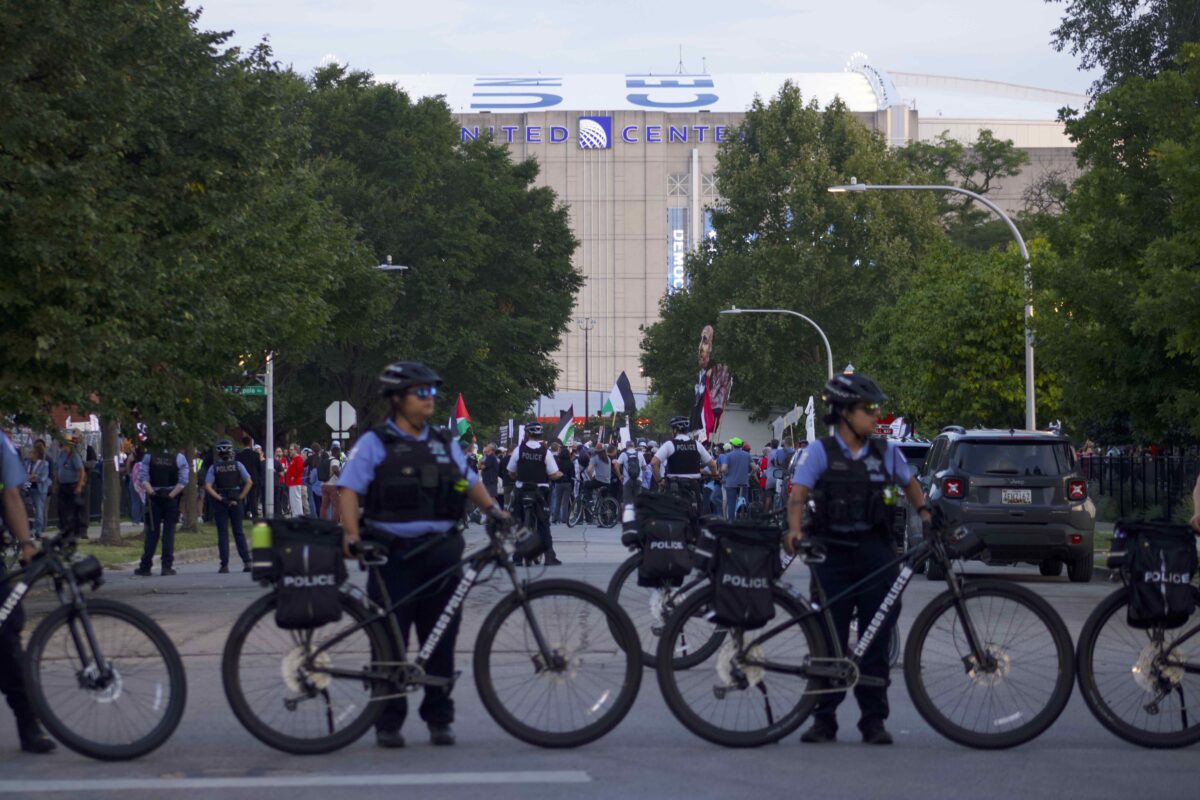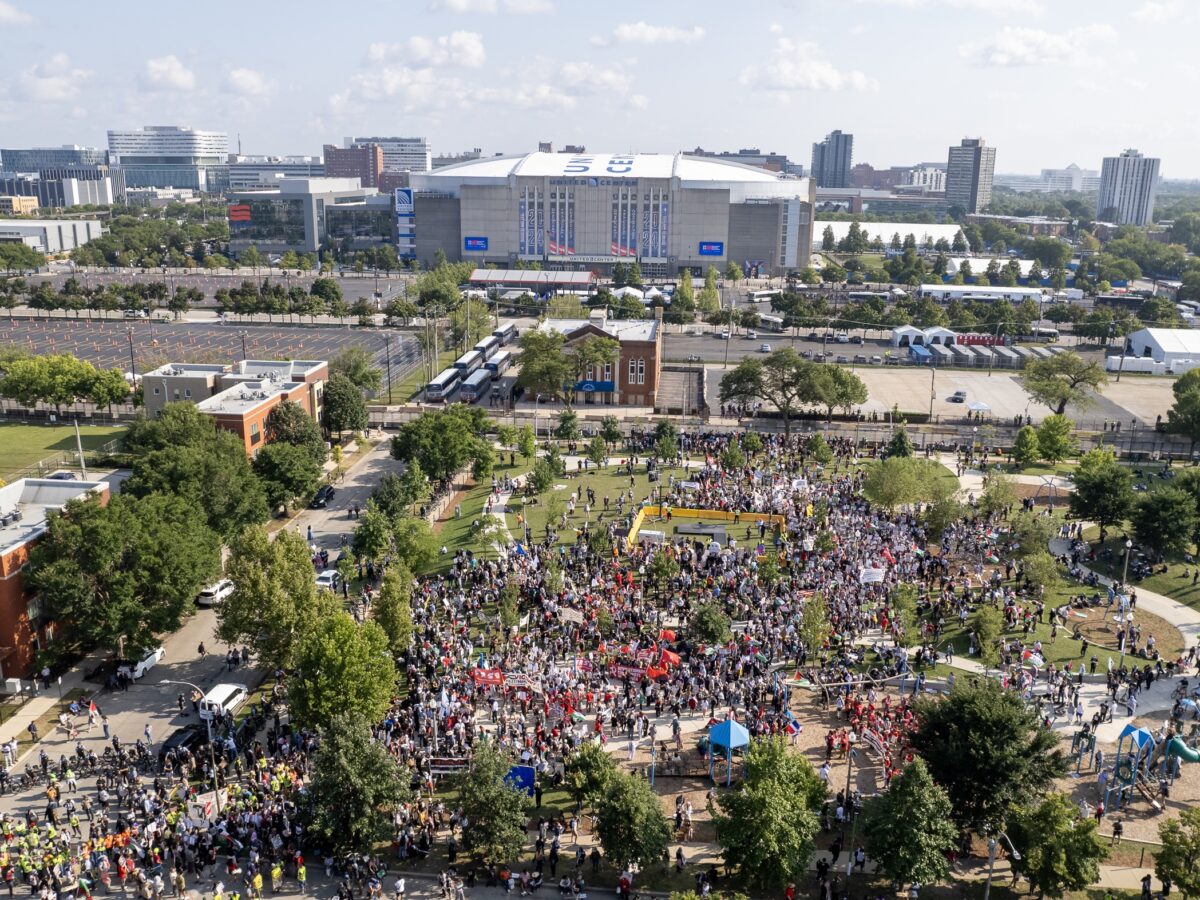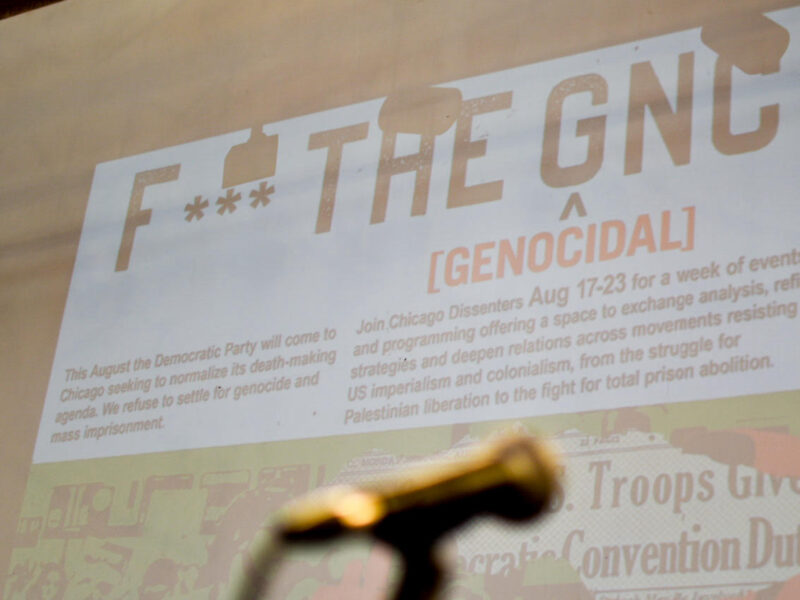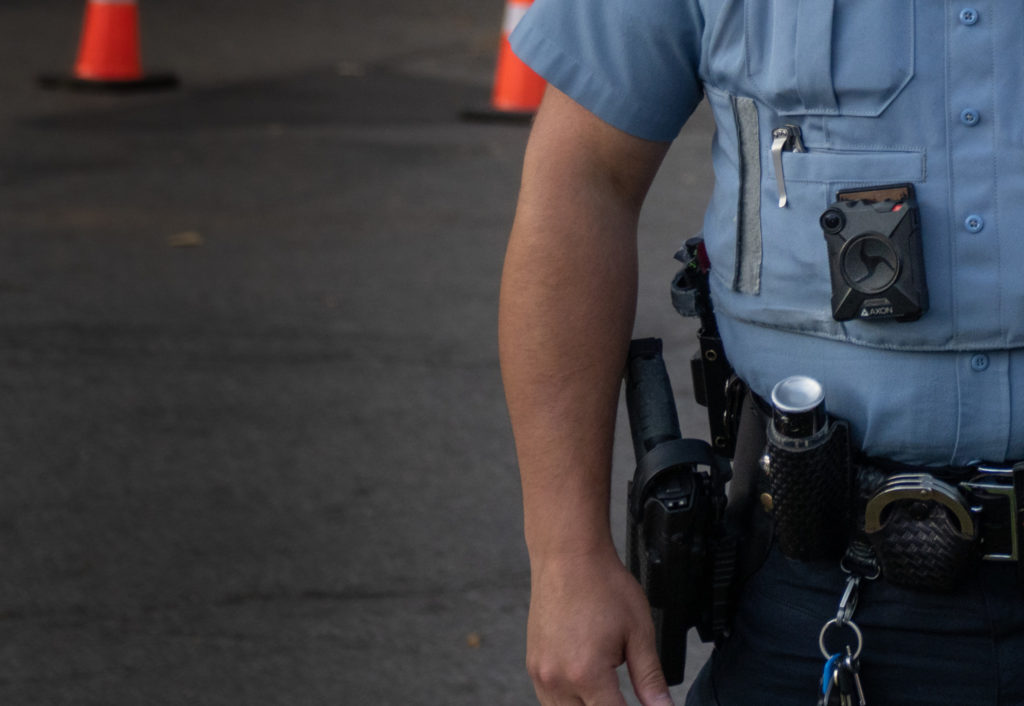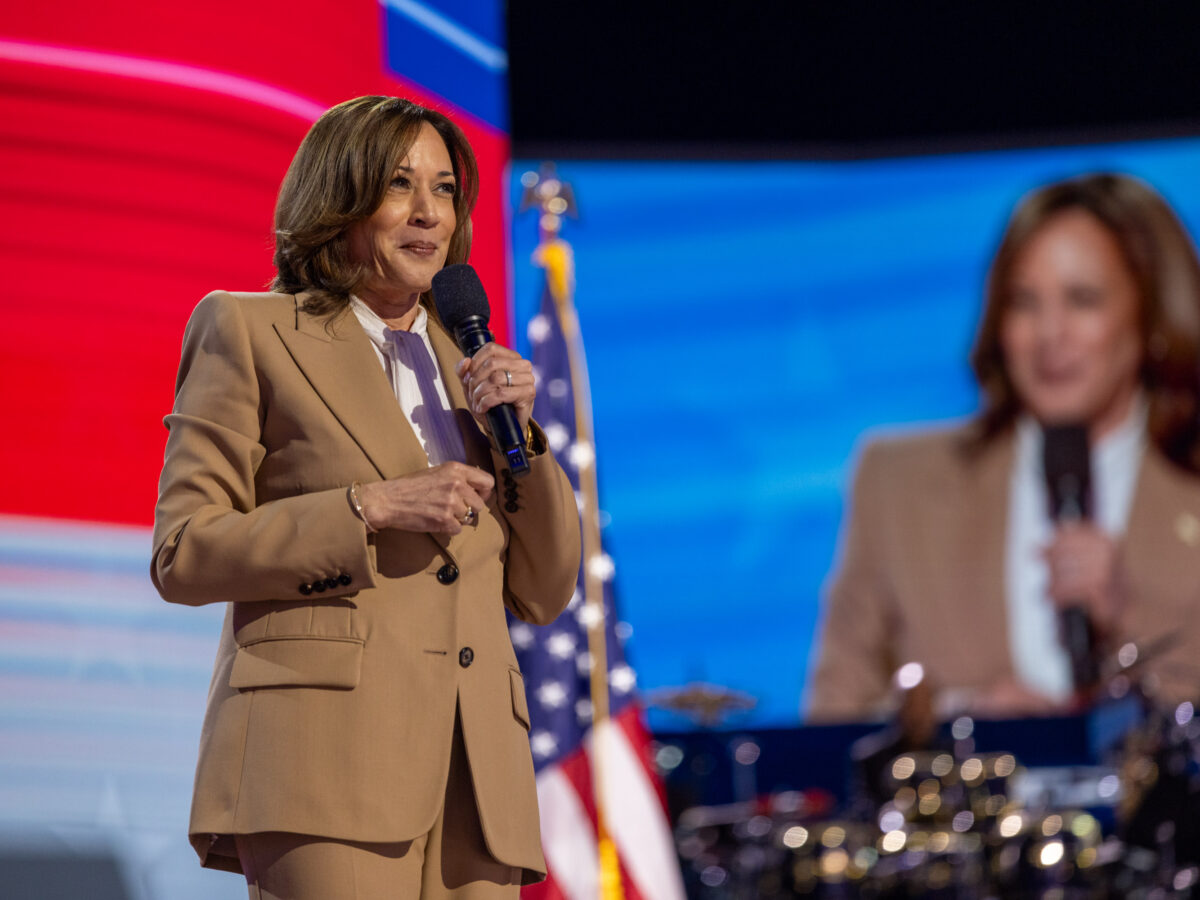As thousands of buoyant delegates applauded the dozens of speeches made during the four days of the Democratic National Convention (DNC) this week, pro-Palestinian protesters flooded Chicago’s streets by the thousands to show they were not forgetting Gaza nearly a year after the conflict began.
Along the Magnificent Mile on Thursday, the final day of the convention, protesters chanted “Free Palestine” and rang cow bells as delegates boarded buses outside their hotels heading to the United Center. Outside the Israeli consulate near Ogilvie Transportation Center, several rabbis waved signs bearing anti-Zionist slogans while office workers in nearby skyscrapers watched and took videos on their phones.
And in Union Park, thousands of protesters—young and old, Black, white, Arab, Filipino and Latinx, cis and trans, able and disabled—showed up to vent their anger and frustration with the Democrats for sending billions of dollars in military aid to Israel amid its ongoing war in Gaza following the killing of 1,200 people and the kidnapping of 250 hostages by Hamas militants on October 7.
Since then, the conflict has claimed more than 40,000 Palestinian lives, many of them women and children, according to the Gaza Ministry of Health.
On Monday, the DNC’s first night, President Joseph Biden acknowledged the protesters “out on the street” in his convention speech, saying, “they have a point.”
Regarding the war in Gaza, Biden said, “A lot of innocent people are being killed on both sides.” He added that his administration is working to deliver more humanitarian aid to Gaza and pressing for a ceasefire to bring an end to the conflict.
Faayani Aboma Mijana, a a member of the Chicago Alliance Against Racial and Political Repression (CAARPR) and spokesperson for the coalition that organized Monday’s demonstration, said that the protests were meant to send a message to the Democratic Party’s leadership that they risk losing a significant portion of the electorate without an immediate ceasefire to the war in Gaza and an end to U.S. aid to Israel.
“We want action. We don’t want platitudes,” Mijana said. “And we’re finding that the best way to get action is to build a mass movement and force them to do it.”
CAARPR is one of more than 250 organizations that were a part of the Coalition to March on the DNC. Others included Students for Justice in Palestine, American Friends Service Committee and Jewish Voice for Peace Chicago, all which took part in demonstrations throughout the past year.
“It is a matter of historical urgency that all organizations who fight for the rights of working and oppressed people in the U.S. join us in this demonstration to stand in solidarity with Palestine,” the coalition said in a statement last month.
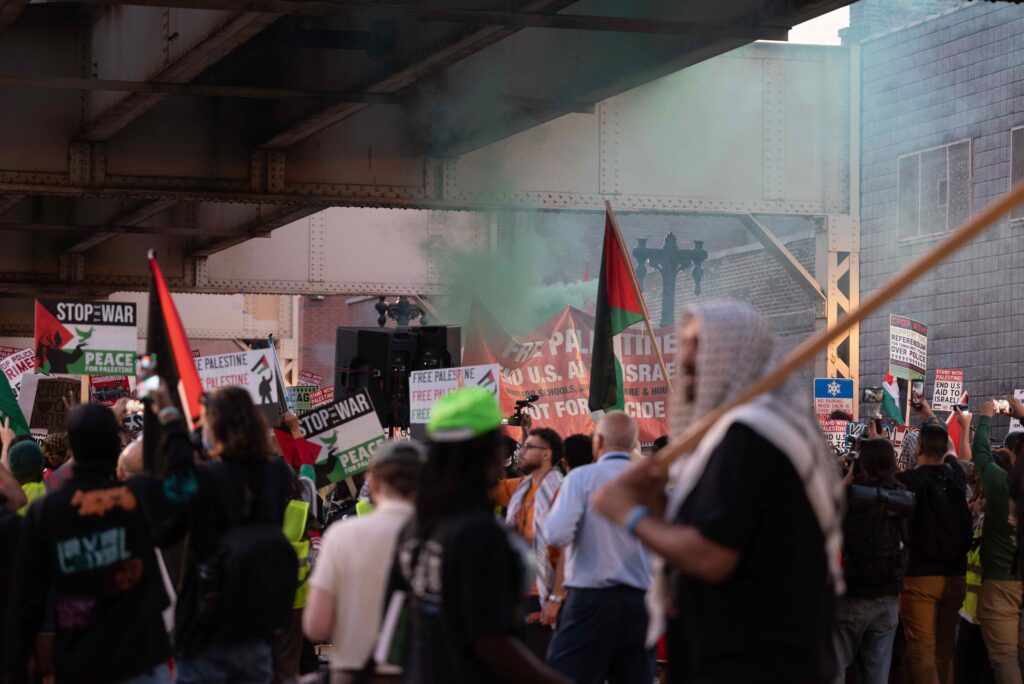
Mijana likened this historical moment to 1968, when large-scale demonstrations were held outside the DNC in Chicago to protest the Vietnam War. Protesters’ slogan that year was: “The whole world is watching.” That year, the world witnessed widespread images of demonstrators bludgeoned by police batons in what would later be described as a “police riot.”
A whirlwind of major political developments occurred in the weeks leading up to this year’s DNC, almost as head-spinning as 1968. That April, the assassination of civil rights leader Dr. Martin Luther King Jr. set off massive uprisings across the nation, including the West Side of Chicago. Just days before, President Lyndon B. Johnson announced he would not seek reelection, and presidential hopeful Senator Robert F. Kennedy was assassinated at a campaign event in California later that summer.
This year, on July 13, former President Donald Trump survived an apparent assassination attempt at a campaign rally in Pennsylvania, just days before receiving his party’s formal nomination for president at the Republican National Convention in Milwaukee. One week later, Biden announced he was dropping out from the race after a period of intense pressure from Congressional Democrats to do so following his disastrous debate performance against Trump.
Hatem Abudayyeh, the chair of the U.S. Palestinian Community Network (USPCN) and a spokesperson for the Coalition to March on the DNC, said the protests targeted the convention in Chicago because Democrats control the White House and the country’s foreign policy. Abudayyeh said that since the war began, the coalition has organized more than a dozen protests in Chicago, all of which drew thousands.
“Tens of thousands are here because the Democrats are in power,” he said. “It’s Biden and Harris and [Anthony] Blinken and all of those senators who are responsible for the deaths and the blood of 40,000 Palestinians.”
Abudayyeh rejected the notion that Democrats represent “the lesser of two evils,” despite Republicans’ support for Israel during its military campaign and Democrats’ public criticisms.
“We recognize the evils of Donald Trump. Everybody does. Nobody wants him to be president,” he said. “But the Democrats have been taking Black and Latino and Mexican and Arab and Muslim and Palestinian communities for granted in this country for decades.”
Abudayyeh said his disillusion with Democrats goes back multiple administrations, dating to the 1990s. “We have not seen anything from Clinton or Obama or Biden that has proven to us that the Democrats are more fair or more balanced in their treatment of the issue,” he said.
Over the last thirty years, Israel has constructed more than 100 settlements across the West Bank, home to some 500,000 settlers. Attacks by Israeli settlers and religious nationalists on Palestinians are frequent and have grown more common since October 7.
Former Presidents Bill Clinton and Barack Obama spoke at the convention. Obama did not mention Palestine. Clinton, who nearly struck an Israeli-Palestinian peace deal in the final days of his presidency, called for peace in the Middle East.
On Thursday, several thousand marched through the Near West Side ahead of Vice President Kamala Harris’s acceptance speech. As the demonstration looped down Harrison, up Damen, and back to Union Park along Lake, phalanxes of helmeted police surrounded protesters at every turn, blocked off side streets and blanketed El platforms.
Many of the previous protests made Biden the principal target of their vitriol. Abudayyeh said that it made no difference to protesters that Harris is now the Democratic nominee.
“Kamala Harris is a representative of the administration,” he said. “She’s part of the policymaking when it comes to Palestine and Israel and Gaza. She is complicit in the genocide. She has blood on her hands like Joe Biden does.”
In May, Biden presented a three-phase proposal for a ceasefire based on the Israelis’ previous negotiating position. It has yet to come to fruition. The week before the DNC, the administration renewed its push for a ceasefire deal between the parties while greenlighting $20 billion in arms sales to Israel.
Abudayyeh said that regardless of whether a ceasefire-for-hostages deal happens before Election Day in November, he thinks public opinion towards Israel has changed irrevocably. Similar to the pressure South Africa faced in the 1980s, he thinks an international consensus is building against Israel operating as an “apartheid state” under the government of Benjamin Netanyahu.
“Even in the United States,” he said, “Israel is [now] recognized as the state that the Palestinians call it: a white settler, colonialist, racist, apartheid, Zionist state.”
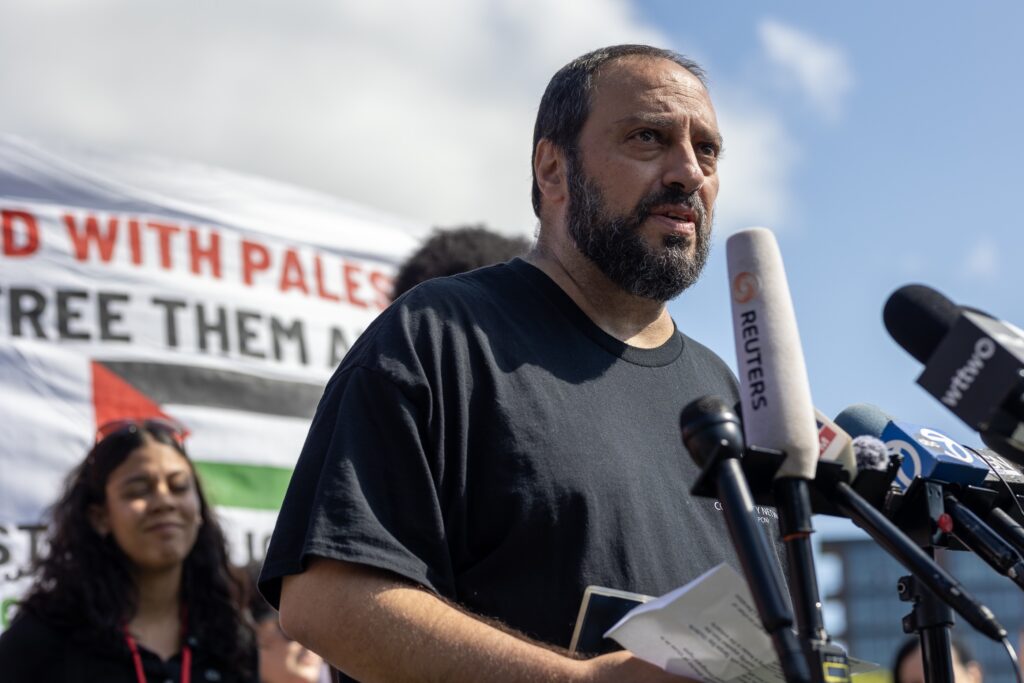
Ahead of the DNC, CPD superintendent Larry Snelling tried to assuage concerns that 2024 could be a reprisal of 1968, when CPD officers indiscriminately attacked anti-war protesters, journalists, and bystanders in a police riot.
“We will not allow people to come here and destroy this city,” he said.
Snelling was frequently front-and-center at protests, coordinating the massive police response to them all week. Hundreds of police officers flanked the marches and demonstrations in endless shoulder-to-shoulder lines.
CPD arrested seventy-six protesters last week, according to the National Lawyers Guild (NLG) Chicago chapter, whose members were on hand to monitor the police response at each of the protests. The majority of the arrests occurred Tuesday, the second night of the DNC, at a protest outside the Israeli consulate, where about 200 activists were met by far greater numbers of police.
Kevin Sullivan came from South Florida to take part in Tuesday’s protest, which was organized by Behind Enemy Lines, a self-described “militant anti-imperialist” group founded after the 2020 George Floyd rebellions. During the protest, activists burned a joint American/Israeli flag and yelled obscenities. Sullivan said the police made the situation dangerous by deliberately confining demonstrators to narrow spaces, a tactic known as “kettling.”
“It’s something that really creates a risk of people getting seriously injured,” he said.
Towards the end of the protest, Sullivan got trapped between a swarm of riot police and a line of bicycle cops as activists tried to escape up Canal Street.
“It was really packed in there,” he said. “It was scary.”
Sullivan was ultimately able to leave the scene, but dozens of protesters and at least two journalists were arrested. At a press conference the next day, Superintendent Snelling said the journalists had been “too close” to protesters.
The Nation later reported that Tom Ahern, CPD’s deputy director of news affairs, “forcefully” removed photojournalist Josh Pacheco’s press credentials after he was arrested. A CPD spokesperson told the Weekly the credentials “were taken in the process of an arrest, and they were returned the next day to a lawyer.”
Pacheco, whose credentials were issued by the NYC Mayor’s Office, told the Weekly that while they were being loaded onto a police wagon, Ahern “made the calculated decision to violently rip my credentials off my person,” pulling some of the photojournalist’s hair out in the process. “It was through the tireless efforts of journalists, photographers, and media lawyers that my credentials were located, sent to my lawyer’s office, and returned to me nearly twenty-four hours later,” Pacheco said. “None of this is right.”
“The massive shows of force and very aggressive posture toward First Amendment-protected activity, including the deliberate obstruction of a Palestine solidarity march from the Israeli consulate on Tuesday, indicated an intolerance to people’s free speech rights,” said Madeline Townsend, a member of the Chicago chapter of the National Lawyers Guild (NLG). “Police far outnumbered protesters on Tuesday, indiscriminately arresting people and often surrounding and corralling groups before conducting mass arrests.”
In a statement, NLG Chicago said four arrested protesters required hospitalizations, including two as a result of injuries sustained at the hands of police. Snelling confirmed the first figure while claiming several officers were injured in the course of the protests but that they refused medical treatment because they wanted to remain with their fellow officers.
The Civilian Office of Police Accountability, a police-oversight agency that investigates allegations of police misconduct, said it had received eight DNC-related complaints as of press time. Two were for excessive use of force by officers and two alleged civil rights violations.
At a press conference on Friday, Snelling commended his officers for keeping the city safe while protecting First Amendment activity.
“Right now, I’m living in the glow of the work that these police officers did,” he said.
Snelling claimed police showed restraint in the face of goading by protesters.
“We saw people yelling in their faces, yelling obscenities, and they maintained their cool throughout, they didn’t take the bait,” he said. “So again, please, can we stop talking about 1968?”
Thousands March for Gaza on First Day of DNC
Getting the march to within blocks of the United Center was a long and arduous fight for Abudayyeh and the coalition, which wrangled with the City for months over the location and length of the demonstrations in federal court. Negotiations about sound and stage equipment continued until the week before the DNC. Ultimately, the coalition was allowed to march from Union Park to Park 578, which has a direct line of vision to the United Center, and then back to Union Park along Lake Street.
While some residents along the route greeted the protesters with Palestinian flags showing their support, others weren’t so enthusiastic. Lester Smith, a sixty-eight-year-old Black man who lives along the march route, was upset the march was funneled down his residential block. And because of road closures due to the protests, he was unable to get food and medication delivered to his home.
“The United Center’s what, four blocks from here? Doesn’t make any sense,” he said.
The pro-Palestinian rallies were also met by counter-protesters, some of whom were bent on disruption, others in soaking up the media spotlight.
On Monday, Mark Julian, a Chicago-based pastor, held up an Israeli flag at a small pro-Israel rally on the edge of Union Park. A line of bicycle police protectively surrounded the counter-demonstrators.
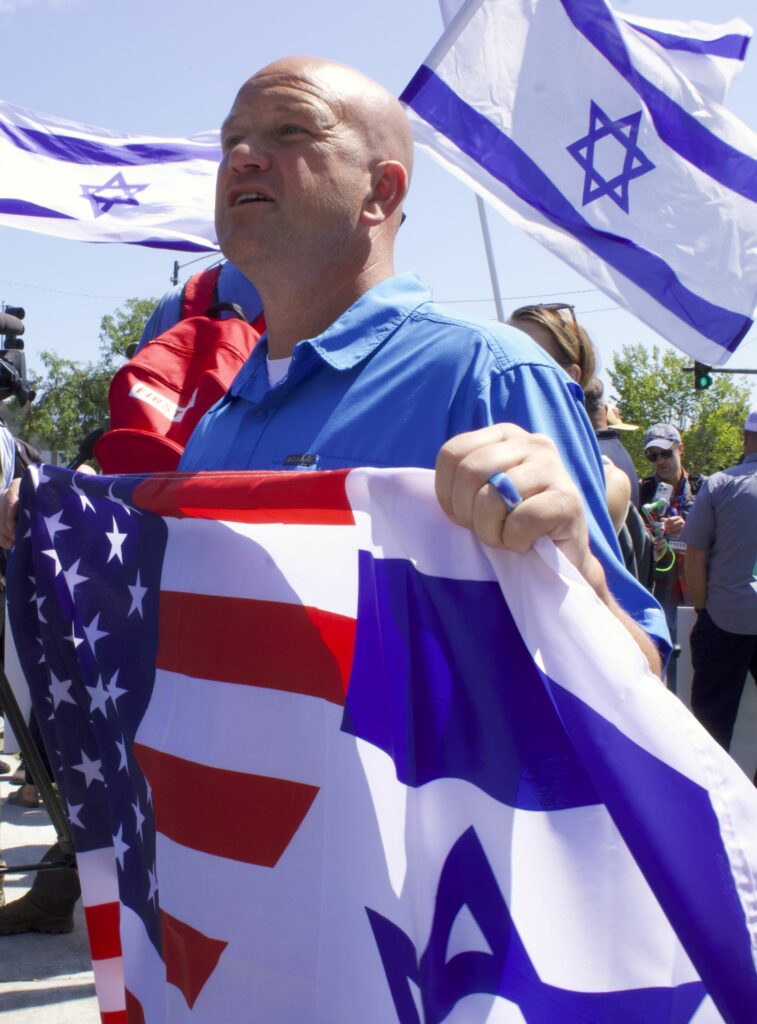
The pro-Palestine demonstrators “have a right to do what they’re doing, but we have a right to stand up to have a counter opinion,” Julian said. He added that Israel has a right to defend itself because it was “attacked first” on October 7, and that if Hamas would surrender, the war could “end tomorrow.” He claimed the “Jewish State has always been over and above helping the Palestinian people.”
In May, the UN reported that the scale of destruction in Gaza hasn’t been seen since World War II and that it would take until 2040 to rebuild the homes flattened by Israel’s assault. “I know that [Israel] would help them in a heartbeat rebuild Gaza,” Julian said.
Despite the clamor about Gaza outside the United Center, there was little mention of it within. During Biden’s speech on Monday, several Jewish and Muslim “uncommitted” delegates unfurled a banner in the arena reading “Stop Arming Israel.” Other delegates covered the banner with signs before snatching it away. On Wednesday, as Harris’s running mate Tim Walz spoke, a group of Jewish and Muslim uncommitted delegates began a sit-in outside the United Center to demand a Palestinian be allowed to speak at the DNC. Harris’s team steadfastly refused to do so.
“It’s so important to appease the pro-war forces in our country that are making money off of the killing of babies in Gaza that [Harris] won’t let even a Palestinian American speak from this stage,” said Abbas Alawieh, a self-described “ceasefire delegate” from Michigan who took part in the sit-in. He predicted that the Democrats’ decision to “suppress the voices of Palestinian Americans” will prove unpopular with voters.
Harris briefly acknowledged the war on Gaza toward the end of her acceptance speech. After affirming that she would “always ensure Israel has the ability to defend itself,” the Vice President said, “At the same time, what has happened in Gaza over the past ten months is devastating,” adding that she and Biden “are working to end this war, such that Israel is secure, the hostages are released, the suffering in Gaza ends and the Palestinian people can realize their right to dignity, security, freedom and self-determination.”
Husam Marajda, a member of USPCN, said the massive demonstrations made Palestine “impossible to ignore” at the convention.
“The DNC would have loved to just talk about Trump and how great of a president Biden is, but guess what: all of the media couldn’t stop talking about the genocide on Palestine this week because of our organizing,” he said. “And we’re going to keep organizing until U.S. aid to Israel is ended and Palestine is free.”
Max Blaisdell is a fellow with the Invisible Institute, a staff writer for the Hyde Park Herald, and an investigative reporter for the Weekly.

